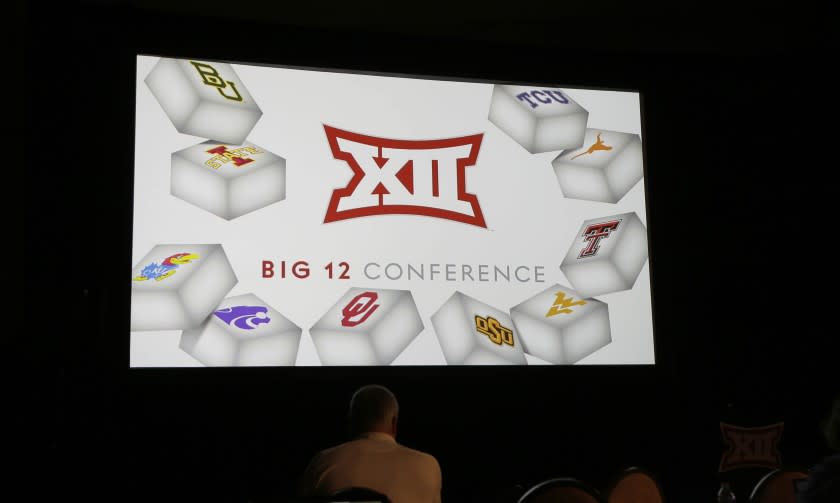The Big 12 Conference says it will boldly go where the Pac-12 and Big Ten won't

The Big 12 Conference forged ahead Wednesday, announcing it would play football as scheduled in a break with two of its major conference counterparts that pulled the plug on a fall season after saying the health risks were just too great.
In a dissenting stance, the Big 12 said its teams could safely move ahead.
“Our student-athletes want to compete, and it is the board’s collective opinion that sports can be conducted safely and in concert with the best interests of their well-being,” Texas Christian Chancellor Victor Boschini, the Big 12 board of directors chairman, said in a statement. “We remain vigilant in monitoring the trends and effects of COVID-19 as we learn more about the virus. If at any point our scientists and doctors conclude that our institutions cannot provide a safe and appropriate environment for our participants, we will change course.”
The Big 12’s decision came one day after the Pac-12 and Big Ten moved in the opposite direction and canceled their fall sports seasons. The Pac-12 said no sports competitions would be held before Jan. 1, also pushing back the start of their winter sports, including basketball.
The Big 12 said it would take additional safety measures to protect its athletes, with enhanced COVID-19 testing that would be conducted three times a week in what it described as high-contact sports, including football, volleyball and soccer. Players who test positive must undergo blood tests, echocardiograms and cardiac MRIs to detect any potential heart abnormalities. At least 10 players from the Big Ten reportedly developed heart inflammation linked to their having contracted COVID-19.
Additionally, the Big 12 said its nonconference opponents must meet its virus testing protocols in the two weeks before playing one of its teams.
“The virus continues to evolve and medical professionals are learning more with each passing week,” Big 12 Commissioner Bob Bowlsby said in a statement. “Opinions vary regarding the best path forward, as we’ve seen throughout higher education and our society overall, but we are comfortable in our institutions’ ability to provide a structured training environment, rigorous testing and surveillance, hospital quality sanitation and mitigation practices that optimize the health and safety of our student-athletes.”
As part of its announcement, the Big 12 released a revised football schedule that includes nine conference games and one nonconference game, with the conference schedule beginning Sept. 26.
The Big 12 championship is tentatively scheduled for Dec. 12. Stadium capacities for regular-season games will be determined by each school, guided by local and state health ordinances.
With three of the Power Five conferences having formally announced their intentions, the Southeastern and Atlantic Coast conferences have been put on the clock. SEC Commissioner Greg Sankey said Tuesday that he was pondering the situation, though the conference is widely expected to move ahead with its fall sports schedule.
“I look forward to learning more about the factors that led to the Big Ten and Pac-12 leadership to take these actions,” Sankey said in a statement. “I remain comfortable with the thorough and deliberate approach that the SEC and our 14 members are taking to support a healthy environment for our student-athletes. We will continue to further refine our policies and protocols for a safe return to sports as we monitor developments around COVID-19 in a continued effort to support, educate and care for our student-athletes every day.”


